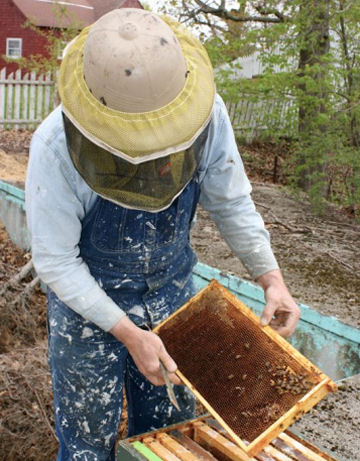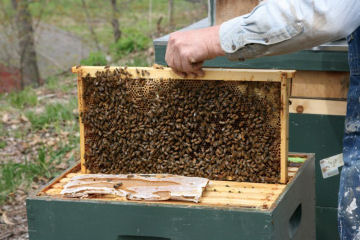| |||||||||||||||||||||||||||||||||||||||||||||||||||||||||||||||||||||||||||||||||||||||||||||||||||||||||||||||||||||||||||||||||||||||||||||||||||||||||||||||||||||||||||||||||||||||||||||||||||||||||||||||||
|
June 13, 2007 Entomologists—scientists who study insects—have a real mystery on their hands. All across the country, honeybees are leaving their hives and never returning.
It doesn't take long before a hive is nearly empty. Researchers call this phenomenon colony-collapse1 disorder2. According to surveys of beekeepers across the country, 25 to 40 percent of the honeybees in the United States have vanished from their hives since last fall. So far, no one can explain why.
Colony collapse is a serious concern because bees play an important role in the production of about one-third of the foods we eat, including apples, watermelons, and almonds. As they feed, honeybees spread pollen5 from flower to flower. Without this process, called pollination6, a plant can't produce seeds or fruits. Now, a group of scientists and beekeepers has teamed up to try to figure out what's causing the alarming collapse of so many colonies. By sharing their expertise7 in honeybee behavior, health, and nutrition, team members hope to find out what's contributing to the decline and to prevent bee disappearances9 in the future. Sick bees? It could be that disease is causing the disappearance8 of the bees. To explore that possibility, Jay Evans, a research entomologist at the United States Department of Agriculture (USDA) Bee Research Laboratory, examines bees taken from colonies that are collapsing. "We know what a healthy bee should look like on the inside, and we can look for physical signs of disease," he says. And bees from collapsing colonies don't look very healthy. "Their stomachs are worn down, compared to the stomachs of healthy bees," Evans says. It may be that a parasite10 is damaging the bees' digestive organs. The bees' inability to ward11 off such parasites12 suggests that their immune systems may not be working as they should. The honeybees have other signs of troubled immune systems, such as high levels of bacteria and fungi13 inside their bodies, says Dewey Caron, an entomologist at the University of Delaware. He's one of the leaders of the colony-collapse research team. But why would parasites, bacteria, or fungi in the body cause bees to leave their hives? After all, when you're sick, you want to stay at home, right? Caron says that some of these disease-causing agents may lead to disturbances14 in bee behavior. "It may be that sick bees are not processing information correctly and learning where home is," he says. In other words, a sick bee might leave the hive and simply forget how to get back. If enough of the bees in a colony can't find their way home, he says, it's just a matter of time before the colony collapses15. Being social insects, even healthy bees are unable to live long on their own. And once the bees vanish, the crops that they usually pollinate are in trouble. Environmental clues Another cause of colony-collapse disorder may be certain chemicals that farmers apply to kill unwanted insects on crops, says Jerry Hayes, chief bee inspector16 for the Florida Department of Agriculture. Some studies, he says, suggest that a certain type of insecticide affects the honeybee's nervous system (which includes the brain) and memory. "It seems like honeybees are going out and getting confused about where to go and what to do," he says. Adding to the mystery, Hayes says, is an observation about moths17 and other insects that frequently use empty beehives to raise their own young. "Usually, they move right into an empty hive," he says, "but now they're waiting several weeks before they do." As Hayes sees it, this suggests that something repellent in the hive may not only be driving out bees but also keeping other insects from moving in, he says. So far, scientists haven't identified what that repellent thing could be. If it turns out that a disease is contributing to colony collapse, bees' genes could explain why some colonies have collapsed19 and others have not. In any group of bees—or other animals, including people—there are many different kinds of genes, because each individual has a slightly different unique set of genes. The more different genes a group has, the higher the group's genetic20 diversity. And genetic diversity is a plus as far as survival is concerned. Some scientists are now studying genetic diversity in honeybee colonies to see if it has an effect on colony collapse disorder. "If a colony is genetically21 diverse, it's less likely the colony will be wiped out completely from a sweeping22 infection or disease," says David Tarpy, a University of North Carolina entomologist. That's because at least some bees in a genetically diverse group are likely to have genes that help them resist any specific disease that gets into the colony, he says. Scientists haven't determined23 the role of genetic diversity in colony collapse, but it's a promising24 theory, says Evans. He and his colleagues at the USDA bee lab are currently running genetic tests on bees from collapsing colonies. Their goal is to find out whether there are genetic differences between the bees that vanish and those that remain in their hives.
Scientists are working hard to figure out the causes of colony collapse. Meanwhile, bees continue to disappear. Can anything be done to help them survive? Tarpy suggests that more people could raise bees to help restore their numbers. "Given this decline in honeybees, if you want to get active in helping25 to promote pollination, the best thing to do is to become a beekeeper and keep your own bees," he says. Don't be put off by the possibility of a sting, says Dan Geer, who raises bees in North Smithfield, Rhode Island. First of all, beekeepers can wear protective gear. And bees, he says, have a bad rep. "You'd be surprised by how gentle they are," he says. 点击  收听单词发音 收听单词发音
|
|||||||||||||||||||||||||||||||||||||||||||||||||||||||||||||||||||||||||||||||||||||||||||||||||||||||||||||||||||||||||||||||||||||||||||||||||||||||||||||||||||||||||||||||||||||||||||||||||||||||||||||||||
- 发表评论
-
- 最新评论 进入详细评论页>>





